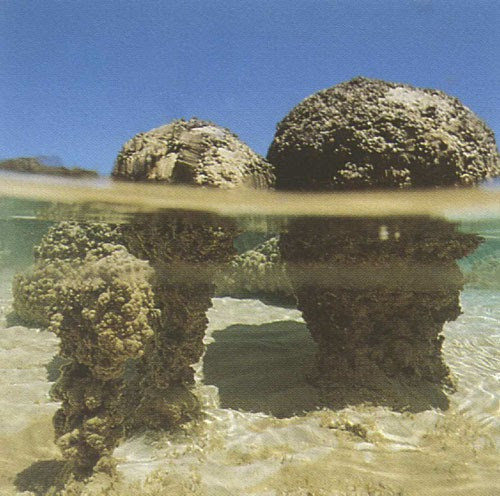In a groundbreaking move for both science and tourism, Sikkim Chief Minister has unveiled plans for the development of a fossil park at a site featuring ancient stromatolites, estimated to be around 1.5 billion years old. This major development aims to highlight Sikkim’s rich geological heritage, boost tourism, and provide a valuable resource for scientific research.
Unveiling Sikkim's Geological Treasures
The new fossil park, to be developed at the site of ancient stromatolites in Sikkim, represents a major initiative to showcase the state’s geological and paleontological treasures. Key aspects of the project include:
A Journey Through Earth's History
The park will feature a captivating light and sound show that narrates the history of Earth, taking visitors on a journey through time. The show will highlight the significance of the stromatolites and their role in shaping the planet's environment.
A Museum of Geological Wonders
The park will house a state-of-the-art geological museum showcasing an array of precious specimens, including the 1.5-billion-year-old stromatolite fossil. Visitors can explore exhibits of index fossils from various parts of the world, gaining insights into different geological periods.
A Geopark Village for Research and Tourism
To accommodate researchers, scientists, and tourists alike, the fossil park will also feature a designated geopark village. This dedicated space will serve as a hub for scientific research, fostering collaboration and exchange of knowledge. It will also provide amenities for visitors, making the park a destination for both exploration and relaxation.
The Significance of Stromatolites
The stromatolite site in Sikkim holds immense scientific and historical value:
Ancient Life Forms
Stromatolites are layered colonial structures predominately formed by cyanobacteria. These ancient fossils are the oldest known fossils on Earth, dating back to more than three billion years ago. They played a crucial role in shaping the planet's foundation by contributing to the formation of essential elements like oxygen, carbon, and nitrogen.
Global Significance
The discovery of the 1.5-billion-year-old stromatolites in Sikkim predates similar finds in Canada, Australia, and the USA. This highlights the site's global importance as a window into Earth's earliest life forms. The site offers valuable insights into the evolution of life on Earth and the processes that shaped the planet.
The Objectives of the Fossil Park
The fossil park aims to achieve several key objectives:
Promoting Geological Awareness
The park will serve as a platform for promoting awareness and understanding of geology and paleontology. Educational programs and exhibits will be designed to engage visitors of all ages, inspiring curiosity and knowledge about Earth's history.
Boosting Tourism
The development of the fossil park is expected to boost tourism in Sikkim. The park will become a major attraction, drawing visitors from both within India and abroad. This will have a positive impact on the local economy, creating jobs and supporting businesses.
Fostering Scientific Research
The park will provide a dedicated research facility for scientists and researchers. The site's unique geological features and the presence of ancient fossils will offer valuable opportunities for study and exploration. The research conducted at the park will contribute to the advancement of scientific knowledge.
The Impacts of the Fossil Park
The establishment of the fossil park is anticipated to have several positive impacts:
Economic Growth
The influx of tourists and researchers will boost the local economy. The park is expected to generate employment opportunities in tourism, hospitality, and research sectors. The development will also create new businesses and provide a much-needed economic stimulus to the region.
Conservation and Preservation
The development of the fossil park will also serve as a conservation effort. The site will be protected and preserved, ensuring the long-term preservation of the ancient stromatolites and other geological features. The park will also promote environmental awareness and sustainable practices.
Educational Value
The park will provide an educational experience for visitors of all ages. Educational programs, exhibits, and interactive displays will engage visitors and inspire a deeper appreciation for Earth's history and the importance of conservation. The park will also serve as a resource for educational institutions and research organizations.
Challenges and Considerations
While the fossil park offers significant opportunities, there are also challenges and considerations:
Sustainable Development
The development of the park must be done in a sustainable manner to minimize environmental impact. Measures should be taken to protect the site's natural beauty and biodiversity. Sustainable infrastructure and practices should be adopted to ensure the long-term viability of the park.
Community Engagement
The development of the park should involve local communities. Their perspectives and concerns should be considered during the planning and implementation stages. The park should also benefit the local communities, creating job opportunities and promoting local crafts and culture.
Funding and Infrastructure
Securing funding and developing infrastructure for the park will be crucial. The government should ensure that adequate resources are allocated to support the project. This includes funding for research, construction, and ongoing maintenance.
A Legacy for Future Generations
The announcement of the fossil park development in Sikkim’s 1.5-billion-year-old stromatolite site marks a major milestone in showcasing the region’s geological and paleontological heritage. By preserving these ancient formations and providing educational and tourism opportunities, the project aims to enhance scientific understanding, attract visitors, and contribute to the economic development of Sikkim. The park promises to become a legacy for future generations, inspiring scientific exploration and preserving a piece of Earth's ancient history.

















